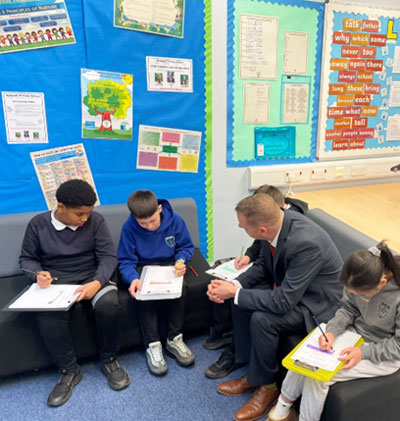Highly effective safeguarding processes at Ashpark Primary School
Ashpark Primary School is a non-denominational school in Arden, in the southside of Glasgow. The school roll is 309 across 13 classes. Almost all children live in Scottish Index of Multiple Deprivation (SIMD) deciles one to three. Approximately one third of children require additional support with their learning. In addition, one third of children have English as an Additional Language (EAL) with 24 languages spoken across the school.
The improvement issue
Senior leaders recognised the need to develop and improve policies and guidance to better take account of new guidance and legislation to protect all children, for example in line with The Promise and the revised National Guidance for Child Protection in Scotland 2021 - updated 2023.
What Ashpark Primary did
As a priority, senior leaders updated the school’s child protection and safeguarding process to take account of national recommendations.
A focus on promoting the ‘The Promise’ by senior leaders resulted in staff creating a quality assurance calendar to ensure more consistency in practice. Senior leaders also introduced highly effective processes to monitor and track children who experience barriers to their learning. These include an increased focus on children who are care-experienced, those from protected groups, and children who are at risk due to personal circumstances. These improved methods are informing more consistent approaches by school staff to provide the best possible care and education for all children.
Senior leaders have developed an additional support for learning school calendar. This helps to ensure that they hold regular review meetings for children. They have developed a register of children requiring additional support for learning. Valuable information about each child is gathered at regular intervals, including the wide range of opportunities that may be contributing to a child’s experiences. For example, leadership committees, extra-curricular activities, school awards and achievement out with school. One-to-one learner conversations are carried out to help gain a deeper perspective of each child as a learner and individual. They involve the child, parent/carers, key staff and a wide range of partners to review the support in place for each child.
What the sustained impact has been
The whole staff team are now better informed by local and national guidelines. The updated school guidance ensures that all staff are aware of their responsibilities in keeping children safe. More rigorous tracking and monitoring procedures are helping to identify and remove barriers or challenges to children’s learning.
The additional support for learning calendar helps to ensure that parents/carers meet on a regular basis with a member of staff and key partners to discuss their children’s progress and ensure equity in their learning opportunities.
Senior leaders are now more systematically recording and tracking important information, including strengths, views, identified needs and future targets for each child. This more robust and comprehensive approach helps to ensure that no child is at risk of missing out. Senior leaders use this information to plan support that better meets individual children’s needs.
Children have a greater voice through improved learning conversations that take place each term. These meetings ensure that children are involved regularly in discussions about their progress and are involved in setting their next steps in learning.
National Guidance for Child Protection in Scotland 2021 - updated 2023

